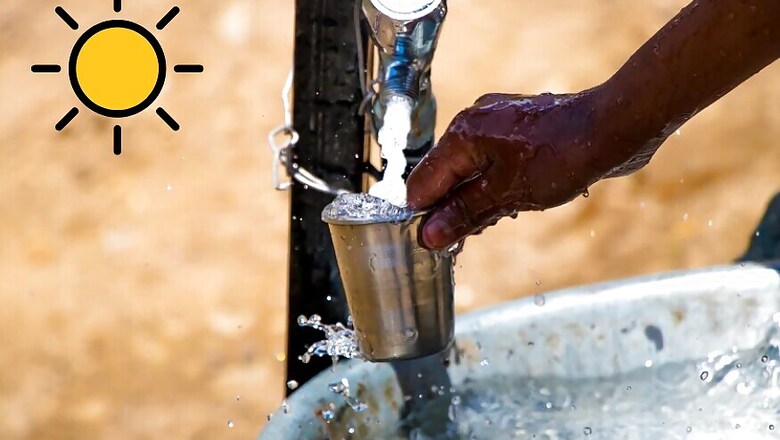
views
About 45 lakh tap connections have been provided under the Jal Jeevan Mission since the central government announced 'Unlock 1' on June 1 amid the coronavirus pandemic, a statement said on Thursday.
The Modi government's ambitious Jal Jeevan Mission aims to provide safe and adequate drinking water through individual household tap connections to every rural household in the country by 2024.
Since the launch of the Mission in August 2019 till March 2020, around 84.83 lakh rural households were provided with tap connections, it said.
"Amidst the COVID-19 pandemic, since Unlock-1, about 45 lakh tap connections have been provided so far in the year 2020-21. Thus, about 1 lakh households are being provided with tap connections daily, which indicates the speed (of the mission)," the statement said.
For ensuring transparency, every asset created is being geo-tagged and connections are being linked with the Aadhaar card of the 'head of the household', it said.
A special focus is being given to the districts affected with Japanese Encephalitis/Acute Encephalitis Syndrome (JE-AES) which is one of the main reasons behind infant mortality in the affected districts. As on date, there are 3.01 crore households in 61 JE/AES endemic districts of five states of Assam, Bihar, Tamil Nadu, Uttar Pradesh and West Bengal, the statement said.
Potable water supply to water quality-affected habitations is also a top priority under the Jal Jeevan Mission (JJM) as the ill-effects of flurosis and arsenicosis are to be reduced.
JJM is also a part of the Garib Kalyan Rozgar Abhiyan (GKRA) wherein efforts are being made to provide employment to migrant labourers by creating public infrastructure. The tentative plan is to take up work in about 25,000 villages spread across six states under implementation, it said.
After the Mission came into being, states were requested to undertake a revalidation exercise of baseline data, as per which there are 19.04 crore rural households in the country, out of which, 3.23 crore households are already provided with tap connections.
"Thus, the objective is to cover approximately 16 crore households in a time-bound manner while ensuring the functionality of the already provided connections. This means 3.2 crore households to be covered every year, that is, approximately 88,000 tap connections to be provided on daily basis, the statement added.
Meanwhile, many states and Union territories are working hard to provide tap connections to every rural household.
"In this endeavour, states like Bihar, Telangana, Maharashtra and Madhya Pradesh lead with excellent performance", the statement said.
In 2020-21, a sum of Rs 23,500 crore has been allocated for the implementation of the Jal Jeevan Mission.
At present, more than Rs 8,000 crore of central funds is available with the states/UTs for the implementation of the Mission, it said.
Besides this, in 2020-21, 50 per cent of the 15th Finance Commission grants to rural local bodies, that is, Rs 30,375 crore have been earmarked for water supply and sanitation.
"Fifty per cent of this amount was released to states on July 15. This will help in better planning, implementation, management, operation and maintenance of drinking water supply systems in villages so that people continue to get potable water on regular and long-term basis," the statement added.
The Mission is also exploring partnerships with reputed national and international agencies, including the United Nations agencies, NGOs/CBOs, CSR organisations, trusts and foundations.
Various states/UTs have also committed to achieve the goal of the Mission well before 2024.
"In 2021, Bihar, Goa, Puducherry and Telangana have planned for complete saturation; similarly, Gujarat, Haryana, Himachal Pradesh, Jammu and Kashmir, Ladakh, Meghalaya, Punjab, Sikkim and Uttar Pradesh have similar plans by 2022. Arunachal Pradesh, Karnataka, Madhya Pradesh, Manipur, Mizoram, Nagaland, Tripura and Chhattisgarh have planned for 100 per cent coverage by 2023; while states like Assam, Andhra Pradesh, Jharkhand, Kerala, Maharashtra, Odisha, Rajasthan, Tamil Nadu, Uttarakhand and West Bengal have planned the same by 2024," the statement added.



















Comments
0 comment